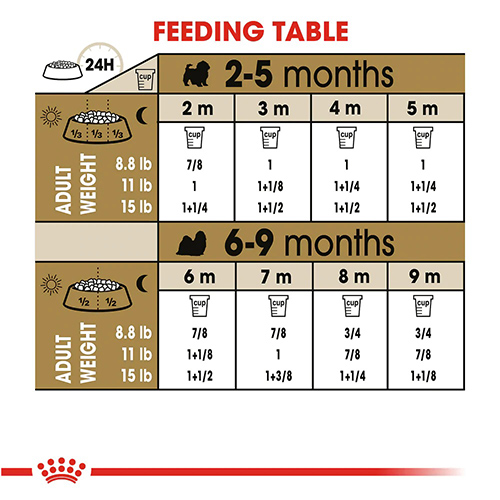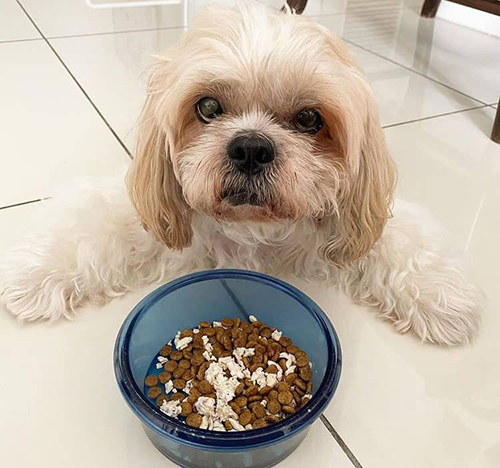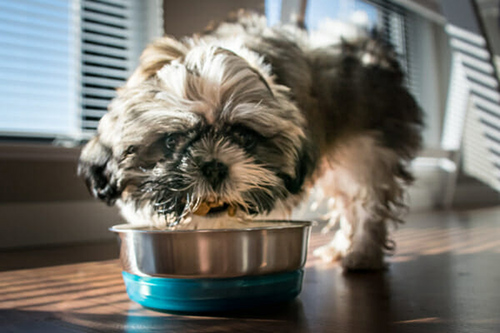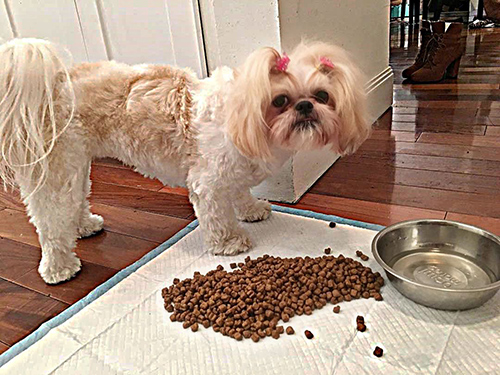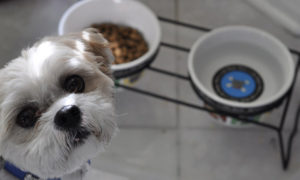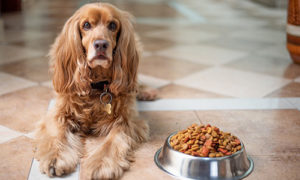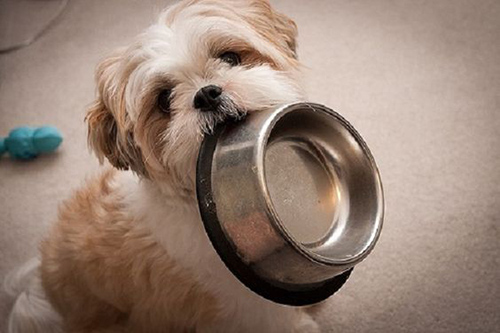
Each brand of food you purchase should indicate how much and what to feed your Shih Tzu on the packaging or container. Specially designed foods for small, medium or large breeds are mostly the same food, just in different sized kibbles. Most dry foods will specify a cup measure based on the body weight of your Shih Tzu. Do your best to avoid foods that indicate to feed a set amount based on breed or classifications of small, medium, and large.
Accurately using the guidelines will help prevent overfeeding and help with weight control and maintenance. Typically, many vets, handlers, and breeders will tell you that dry food should only be fed to your Shih Tzu unless there are particular circumstances. Canned or wet foods seem to cause more dental and digestive issues in Shih Tzu dogs, often resulting in diarrhea and overall poor health. It is often difficult to measure canned foods and much more challenging to understand based on label information.
Sometimes older Shih Tzu dogs, those suffering from certain conditions, pregnant females, or Shih Tzus on specific diets may require canned food, as recommended by a veterinarian. Please do not feed your Shih Tzu until it stops eating or leaves food in the dish. As mentioned earlier, some Shih Tzu will eat everything put in front of them rather than leave any food behind. You may observe that some brands have very distinct feeding levels. Typically, cheaper brands will possess more fillers, seen as the top five ingredients on the label, including terms such as wheat gluten, cereal food, sorghum, or corn.
These items can contain various vitamins necessary for the Shih Tzu, but they are not nutritionally essential in large amounts. To test what happens to your specific brand of dog food, place a small quantity in a shallow dish of warm water for 15 to 20 minutes. Later, if the product is about the same size and still fairly firm, it is relatively easy for the Shih Tzu to digest. However, if you return and it has enlarged or swollen and turned spongy, that is precisely what it is doing in your Shih Tzu’s stomach. This is primarily an “empty” nutritional value food. Also, remember that the more food in, the more waste out.
How Much and What to Feed Your Shih Tzu: Ingredients and Analysis
Pay attention, read the food labels, and look for an average protein base of at least twenty-one percent for less active Shih Tzus or up to twenty-six percent for very busy Shih Tzus. The label will catalog both the ingredients and the analysis. While the ingredients are essential, the analysis is the crucial factor. Use the following information to understand labels better:
- Meat: The meat of chicken, pork, beef, goats, or sheep could include other parts of the animal’s body such as tongues, hearts, and possibly even fat and skin tissue. Typically, this is the peak protein ingredient in the food.
- Meat by-product: This is not meat and is somewhat misleading. Meat by-products are the non-meat items of the animal such as the intestines, bone, blood, and internal organs. This meat ingredient is typically found in cheaper dog food brands.
- Poultry by-product: Like meat by-product, this is the non-meat portion of the chicken, which contains skeleton, heads, blood, and internal organs.
- Meat and bone meal: Ground up bone or meat products further processed to form food.
- Animal by-product meal: Any animal’s added parts that don’t fit into the categories above. It could contain some hair, but it cannot have manure, hoofs, or stomach contents.
- Fishmeal: Clean dry fish meat that is processed, dried, and ground into a powder.
- Corn gluten meal: Created after corn is processed for corn syrup or starch. The dried remains are grounded into a meal.
- Barley meal: Ground barley.
- Brewer’s rice: Small parts of rice leftover from processing.
- Cereal grain fines: Small particles leftover from processing human cereals and ground grains.
- Oatmeal: Ground whole oats that are steamed, pressed, and processed, which is one of the most digestible of the grains.
Many quality dry foods will possess all the vitamins, minerals, carbohydrates, fats, protein, and other nutrients required for your Shih Tzu’s optimal health. Most vets will recommend the various brands they support or believe will provide an ideal, balanced nutrition. The best foods will include all the essential nutritional ingredients in a healthy, palatable, and digestible form.
Usually, good, premium or high-quality dry foods are the correct choices for all Shih Tzus. These foods will be balanced for all types of adult dogs. However, senior Shih Tzu, expecting females and puppies, will need different foods to maintain their health. With premium dog foods, there is no need to provide vitamin supplements to the diet unless instructed by a veterinarian. Overfeeding vitamins is unhealthy and can cause nervous system disorders and improper absorption of nutrients.
If your Shih Tzu does not need vitamin supplements for a health-related reason, be sure to examine your alternatives with your vet. Human vitamins, especially iron, can be extremely dangerous to a Shih Tzu and should never be used. These vitamins are formulated for humans and not the metabolism of a canine.
How Much Food Should a Shih Tzu Eat Per Day
